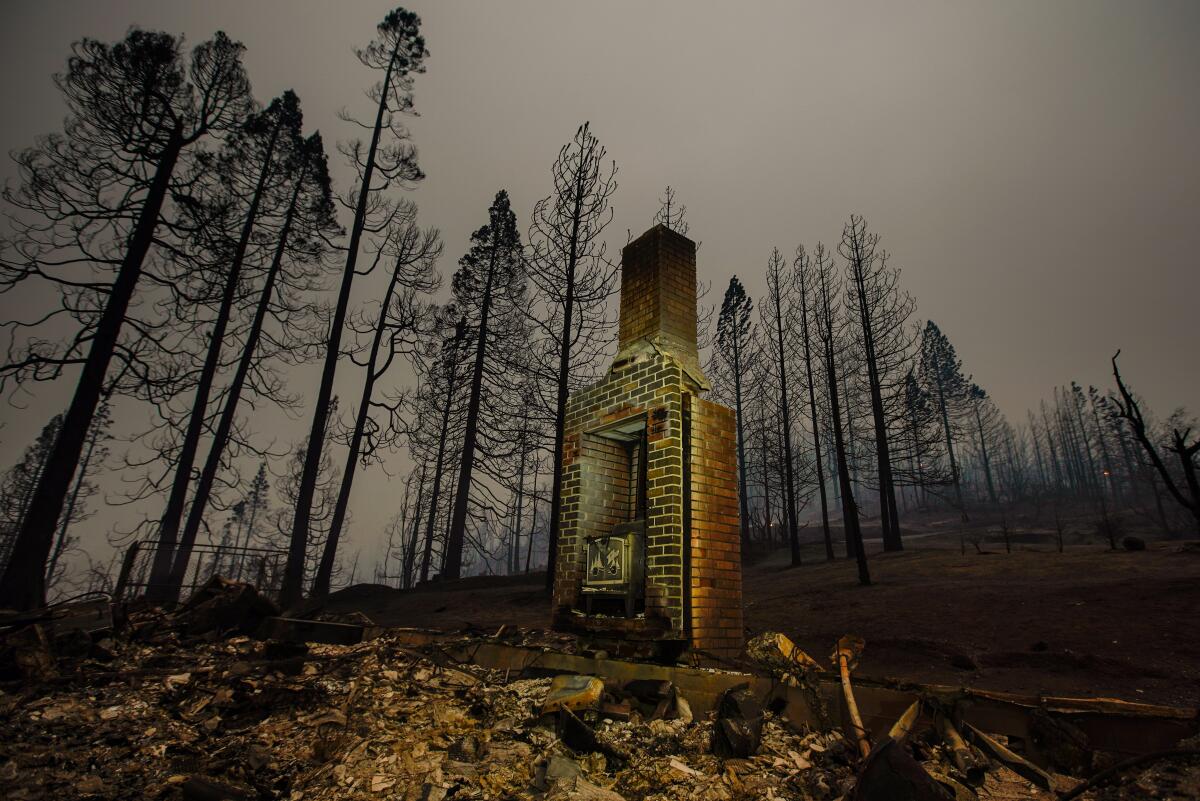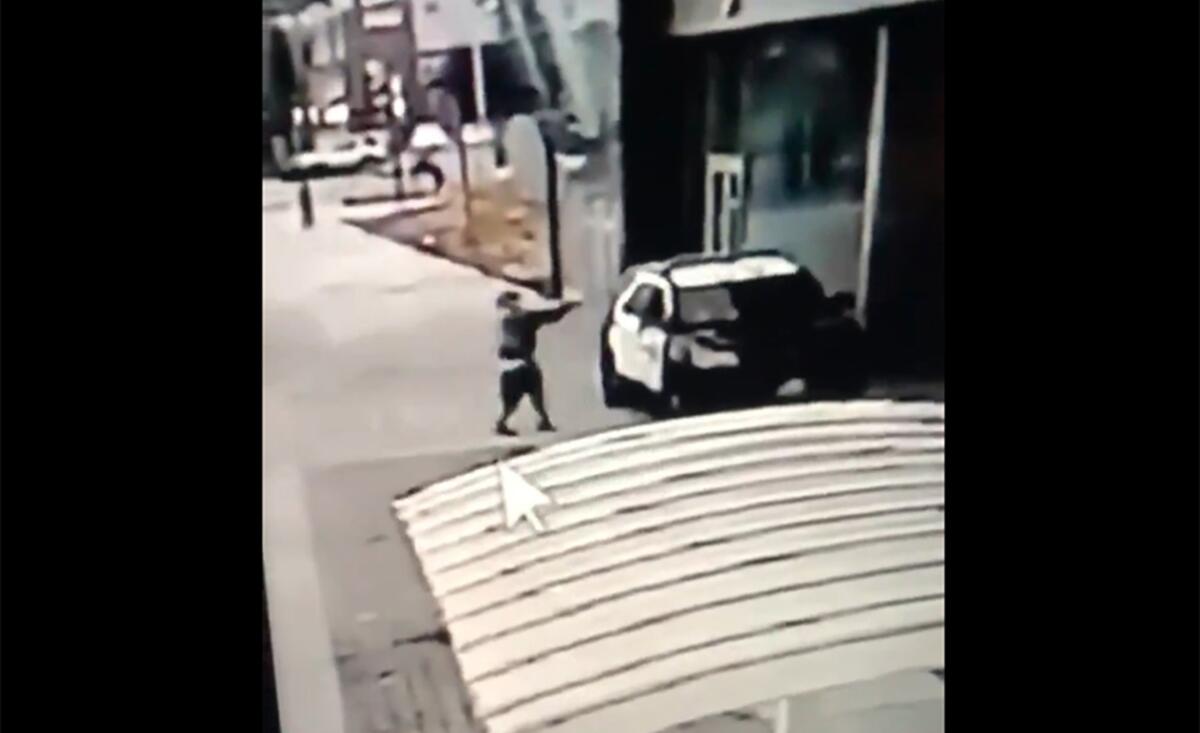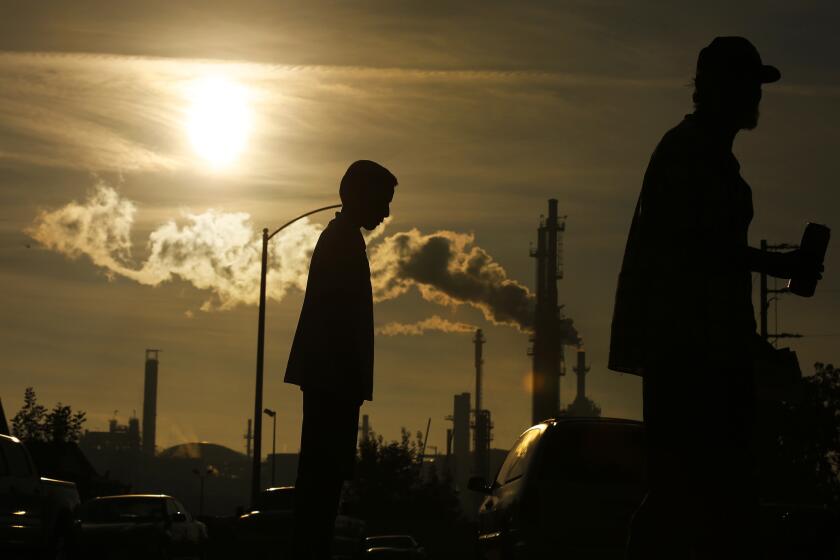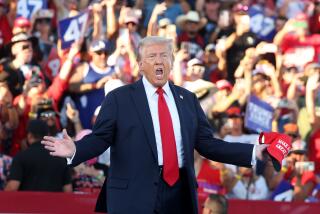Trump’s California visit to spotlight political divides over climate change, coronavirus

WASHINGTON — Ahead of President Trump’s visit to wildfire-ravaged California on Monday, Democrats charged over the weekend that his disregard for basic science had contributed to the worsening annual conflagrations, as well as to the still-uncontrolled spread of COVID-19.
Trump, meanwhile, seized on the shooting Saturday night of two Los Angeles County sheriff’s deputies to try to portray Democratic presidential rival Joe Biden as weak on law-and-order issues, even as Biden and his running mate, California Sen. Kamala Harris, sharply rejected the notion that such violence should go unpunished.
A Western tour that first took Trump to Nevada, where polls give Biden an edge, highlighted the president’s efforts to leverage voter fears about crime and violence amid the year’s protests against racial injustice. He said little about the pandemic, however, as he resumed rallies before close-packed, mostly unmasked crowds. And he suggested, as he has in past years, that Western states’ bad forest management — not climate change — accounts for the intensity of wildfires in recent years.

Trump reinforced his bellicose anti-crime rhetoric with a pair of tweets Sunday about the shooting in Compton, which authorities described as an ambush that left the two deputies critically injured.
“Animals that must be hit hard!” Trump wrote on Twitter, apparently referring to a lone suspect seen on surveillance video walking up to the deputies’ parked car and firing several times. In another tweet, the president said: “If they die, fast trial death penalty for the killer. Only way to stop this!”
Both Biden and Harris, who served as California’s attorney general, expressed sympathy and concern for the deputies, a 31-year-old woman and a 24-year-old man who were recovering from surgery for multiple gunshot wounds and were expected to survive. The Democratic candidates separately called for the perpetrator to be brought to justice.
“Violence of any kind is wrong; those who commit it should be caught and punished,” Biden wrote on Twitter.
Trump told supporters Sunday night in Henderson, Nev., that he had been criticized for calling the gunman who shot the deputies an “animal.” But he doubled down on the statement.
“They said he is a human being,” he told a crowd of cheering supporters, most not wearing masks, at an indoor rally. “He is not a human being. He is an animal.”
Trump’s surrogates, meanwhile, struggled to defend his handling of the COVID-19 outbreak, following a damning new account by Watergate reporter Bob Woodward.
In a combative exchange on CNN’s “State of the Union,” Trump advisor Peter Navarro sparred with host Jake Tapper over the president’s taped acknowledgement to Woodward in early February that he deliberately played down the gravity of the threat after being told the coronavirus was deadly and transmitted by air.
Bristling at Tapper’s contention that Trump misled the public, Navarro countered, “He was straightforward.” He parried with criticism of House Speaker Nancy Pelosi (D-San Francisco), the World Health Organization, China and the U.S. government’s top infectious disease specialist, Dr. Anthony S. Fauci.
Tapper soon cut him off and ended the interview, noting to the broadcast audience that the United States has less than 5% of the world’s population but more than 20% of COVID-19 fatalities. The U.S. death toll is approaching 200,000.
Hours later in Nevada, Trump suggested that the coronavirus’ spread is under control, a contention that has become a staple of his campaign.
“We are rounding the corner on COVID. We are rounding it rapidly, plus we have vaccines coming very soon,” he said at a roundtable with a few Latinos in Las Vegas.
The night before, the president held an open-air rally near Reno that lasted more than an hour and a half. That gathering, and the one Sunday night, defied his own administration’s public health guidance. Republican National Committee chairwoman Ronna McDaniel insisted on NBC’s “Meet the Press” that Trump was not modeling unsafe behavior by disparaging mask-wearing and rarely being seen in one.
“I don’t think this is politically dividing at all,” she said of facial coverings. She said she and her family wear masks, but the choice to eschew them is “about individual freedoms.”
McDaniel also falsely suggested, as Trump and senior aides have repeatedly done, that the U.S. caseload — more than 6.5 million infections to date — is so high in part because “we do have more testing.”
The eruption of dozens of deadly wildfires devastating California, Oregon and Washington state, which have consumed millions of acres and produced apocalyptic orange-tinted skies, has become the latest national tragedy to divide rather than unite the parties.
During his campaign swing, the president belittled West Coast states for poor “forest management,” as he has previously, ignoring the fact that federally managed land accounts for much of the burned acreage. At a rally last month in Pennsylvania, he referred to the need to “clean your floors ... clean your forests.”
Democratic officials say Trump is in denial about the root cause of the ferocious blazes.
“Talk to a firefighter if you think that climate change isn’t real,” said Los Angeles Mayor Eric Garcetti, interviewed on CBS’ “Face the Nation.” He said the Trump administration has “put its head in the sand,” while local officials, Democrats and Republicans alike, have stepped up to combat climate change.
The wildfires, unprecedented in scope and ferocity, are “not just about forest management or raking,” Garcetti said.
Sen. Jeff Merkley (D-Ore.) said on ABC’s “This Week” that the president’s blaming of forest management by state officials is “a big and devastating lie.”
Oregon’s Democratic governor, Kate Brown, interviewed on CBS, acknowledged “decades of mismanagement of our forests in this country” but also cited the necessity of tackling climate change. “We need to do both,” she said.
The wildfires have illuminated the contrast in the two presidential candidates’ shows of empathy. Trump, who is to receive a fire briefing from federal, state and local officials on Monday, has been silent for weeks on the suffering caused by wildfires, although on Saturday he thanked firefighters and other responders.
Trump and Biden hold radically different views on environmental policy and climate change. Here’s what voters can expect from the next president.
Biden thanked firefighters and emergency workers, too, but has also addressed himself to “families who have lost everything” and “people forced to evacuate their homes.”
“Please know that we stand with you now,” he tweeted Saturday.
At every opportunity over the weekend, Trump sought to portray the former vice president, 77, as faltering mentally and physically, as “slow” and “sleepy.”
Biden, interviewed on CNN, guffawed when asked about his fellow septuagenarian’s depiction of him as infirm. Trump is three years younger.
“Just look at us,” Biden said. “Who seems to be in shape; who’s able to move around?”
Trump has seethed about media coverage of recent episodes suggesting his own frailties, including his halting descent of a ramp after addressing cadets at West Point, using both hands to raise a glass to his lips, appearing to drag one leg as he walks and making a still-unexplained trip to Walter Reed National Military Medical Center in November.
“I shouldn’t laugh,” Biden said. He promised to be truthful about his health, as well as other matters, if elected president.
“I’ll acknowledge my mistakes when I make them,” he said. “I’ll level with the American people.”
More to Read
Get the L.A. Times Politics newsletter
Deeply reported insights into legislation, politics and policy from Sacramento, Washington and beyond. In your inbox three times per week.
You may occasionally receive promotional content from the Los Angeles Times.











